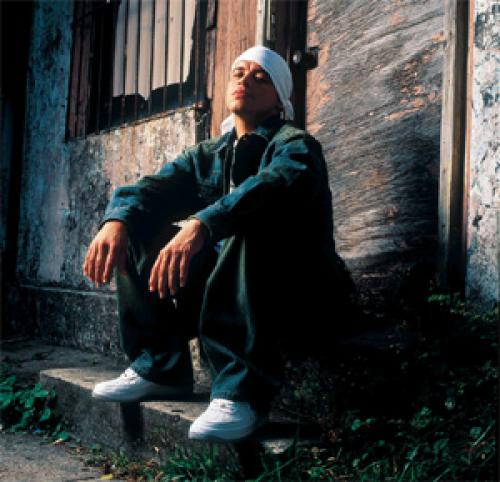 |
 |
 |
VICO C

Artists who touch the emotions of thousands of people live their lives with such intensity that they reach the limits of their existence, constantly transforming, until they conquer their own heavens. This is the story of a man who created a philosophy out of his personal experiences, and in turn created art out of his philosophy.
Brooklyn, New York, is a borough where the mixing of nationalities, customs, and ways of thinking are part of everyday life. And in the midst of those surroundings, Luis Armando Lozada Cruz was born on Sept. 8, 1971. Though he only lived in that area for a short time, he was able to see the world up close - the happy times he enjoyed with his family and the gritty streets of the big city.
Soon after, his family moved to Puerto Rico, in the Puerta de Tierra sector of San Juan.
His parents, Don Rafael and Margarita Cruz, saw early on that their son had artistic talent. They decided to enroll him in the Teatro Pobre de América, under the tutelage of Pedro Santaliz.
The stage helped him develop his talent, but he didn’t decide what he wanted to do with his life until he heard a certain song.
In 1980, “Rapper’s Delight” became a radio hit and inspired Luis Lozada to dream of his future.
Rubén DJ was the first Puerto Rican rapper to garner airplay, and Glenn Monroig was the first to write and popularize homegrown rap on the island. But there was still no icon who represented the great numbers of young people who were going crazy for this new genre.
Aquí estoy filosofo, así me dicen (Here I am, philosopher, that’s what they call me)Nunca dejo que los grandes me pisen (I never let big shots step on me)
Yo soy maestro en la vida social (I’m a teacher of social life)
Y en las mujeres para qué contar (And when it comes to women, what is there to say)
Soy una máquina llena de sabiduría (I’m a machine full of wisdom)
Desde pequeño mi papá lo sabía (Since I was little my father knew)
Que yo algún día iba a comprender (That someday I would understand)
Qué importante yo tenía que ser (How important I had to be)
Inspired by Run DMC and the Sugar Hill Gang, Luis in 1984 formalized his career, christening himself Vico, and adding C simply as a novelty. He’d already tasted popularity with the song “Jasón” together with Rubén DJ, but it was his album LA RECTA FINAL that would make him Puerto Rico’s number one rapper.
By the end of the 1980s, his independent release LA RECTA FINAL had become a collector’s item for his fans. In 1992 he cut a pair of hits that would take him into gold and platinum territory: “Saboréalo” and “María.”
In 1994 his commitment to rap led him to produce other artists and even create his own imprint. His label debuted artists like Liza M., Franceska and Lizzi Estrella, and provided an outlet for the talents of DJ Negro, DJ Playero and DJ Nelson, who defined Puerto Rican rap of the 1990s.
Vico C continued with CON PODER, AQUEL QUE HABÍA MUERTO (sales of 300,000 in the United States), VIVO (Latin Grammy winner), EMBOSCADA (Latin Grammy nominee) and also released greatest-hits collections and special collectors’ editions.
On tour, he created a show that was overflowing with highlights. Vico C understood that rap didn’t have to limit itself to austere presentation. So in addition to his band, his performances included dancers and backing singers.
A dancer who worked for another singer managed to cross the musical border to win his heart and become the love of his life. She’s given him three children and life’s most important lessons in love.
Everything seemed to be going perfectly until a motorcycle accident changed his life and led him to a new awakening. This event, which left him in a deep depression, caused him to seek shelter in a world that, seemingly, could take him away from his emotional suffocation: a world of drugs.
“The addictions to heroin, cocaine, marijuana and alcohol were starting to ruin my life. My home and my family began to be affected until divorce was even considered,” he remembers.
Le ruego a Dios por una vida normal (I pray to God for a normal life)
que lo malo en mi mente no se valla a colar (that the bad things in my mind don’t slip out)
He had experimented with drugs before the accident, but now he was becoming hooked.
“As is normal, I began smoking marijuana in the barrio, before I was famous. And I’d say that I moved to cocaine because I was influenced by the bad friendships that appear in that environment. There’s always someone offering it to you. But it got worse after the accident, when I was banged up. They prescribed me a cornucopia of medicine and since I couldn’t sing, I fell into a depression and I decided it was best for me to be anesthesized all the time,” he explains.
Vico C has one daughter, María Angely, from his first marriage. With his current wife, Sonia, he has three children: Luis Armando “Sugar”, Luis Gabriel “Cuqui” and Enny, all of them witnesses to his painful experiences.
Soy de la calle sin pena (I’m from the street without sorrow)
No te lo niego (I don’t deny it)
Y lo que digo no se trata de un juego (And I what I say isn’t a game)
Tanto en el sexo como en la indiferencia (Both in sex and indifference)
Los niños aprenden por negligencia. (The children learn because of negligence)
Vico C’s artistic evolution continued, but more important was his self-discovery as a human being, going close to the edge and once again focusing on his path.
Then living in Orlando, Florida, Vico C experienced the solitude of a prison cell, though he never let it overwhelm him. To the contrary, it was a time when he felt closer than ever to his family and friends.
On top of all that, he endured the loss of his mother to a serious illness.
But he didn’t give up and instead was motivated to again change his life. In prison, he decided to start recording a new album. This release, which hits retail November 4, 2003, is titled EN HONOR A LA VERDAD and shows the artist with an open heart and his talent reinforced by his experiences and newfound wisdom.
Vico C is an icon in Latino popular culture. His philosophy of life is the same one he expresses in his songs. His education ranges from his drug addiction to his Christian awakening, from life in the San Juan barrios to the stages of the Grammy and Billboard awards, from the intimacy of a family that supports him, to the ovations of a continent that acclaims him.
“I feel very grateful that the people have forgiven me for so many things. I feel like I’ve regained ground not just as a public figure, but as a man,” he says.
Now, Vico C is enjoying his life and career to the fullest, eager to reconnect with his audiences, who are his best friends.
Soy un filosofo sin doctorado (I’m a philosopher without a doctorate)
Porque en la calle yo me he graduado (Because I’ve graduated in the streets)
Soy el filósofo (I’m the philosopher)
Sabiduría y demás (Wisdom and plenty of it)